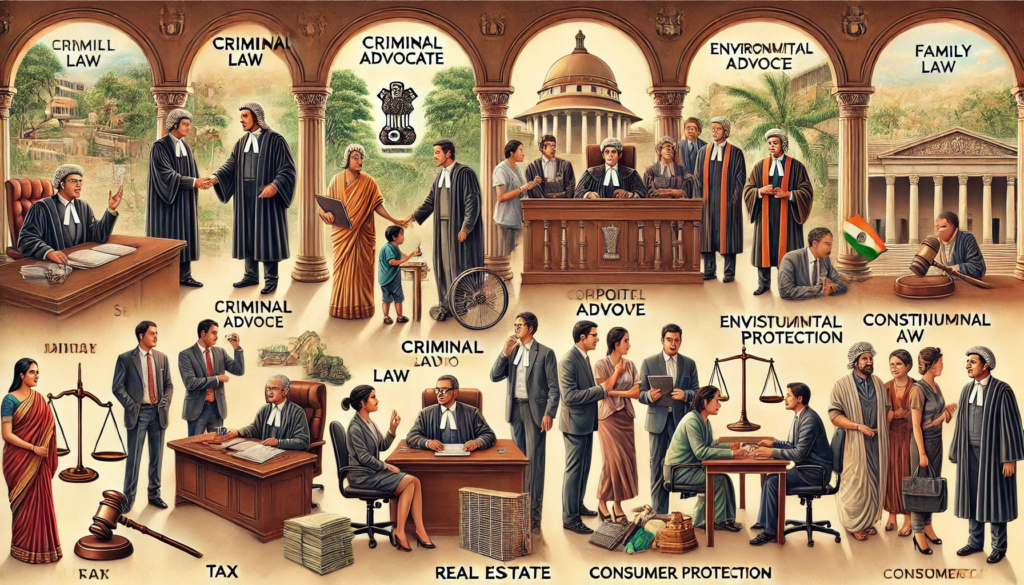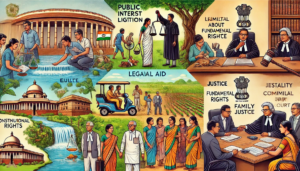There are three topics we covered here ;
1-Types of Advocate in india
2-How to become an advocate
3- Top 10 faQs Regarding this Topic.
In India, the legal profession is regulated by the Bar Council of India (BCI), and advocates are classified based on their qualifications, roles, and areas of specialization. Here are the main types of advocates in India:
1. Senior Advocate
- A Senior Advocate is a distinguished lawyer with significant experience and expertise in a particular area of law. Senior Advocates are designated by the Supreme Court or High Courts after a rigorous selection process. They have the privilege of arguing cases in higher courts and can be appointed as counsel in complex cases.
- Senior Advocates have more authority in court and usually assist other advocates in legal matters.
2. Junior Advocate
- A Junior Advocate is typically a lawyer with less experience or someone who works under a Senior Advocate to gain expertise. They handle routine cases and can represent clients in lower courts but often work as assistants to Senior Advocates in higher courts.
3. Criminal Advocate
- A criminal advocate specializes in criminal law. They represent clients who have been accused of criminal offenses, ranging from minor offenses to serious crimes like murder, theft, and fraud. They may work as defense lawyers (for the accused) or prosecutors (representing the state or government).
4. Civil Advocate
- A civil advocate focuses on civil law, which deals with non-criminal matters like property disputes, contractual disputes, family law, tort cases, etc. They typically handle cases in civil courts, consumer forums, and family courts.
5. Family Law Advocate
- A Family Law Advocate specializes in legal matters related to marriage, divorce, child custody, adoption, inheritance, maintenance, and other issues related to family matters. They represent clients in family courts and other forums dealing with personal laws (Hindu Marriage Act, Muslim Personal Law, etc.).
6. Constitutional Law Advocate
- Constitutional advocates deal with issues related to the Indian Constitution, such as fundamental rights, state authority, judicial review, and public law matters. They often represent clients in the Supreme Court and High Courts in matters involving constitutional interpretation.
7. Corporate/Commercial Advocate
- A corporate advocate specializes in business law, handling cases related to mergers, acquisitions, intellectual property, corporate governance, and disputes between companies. They may also provide legal advice on corporate compliance, competition law, and other commercial matters.
8. Intellectual Property (IP) Advocate
- This type of advocate focuses on protecting the rights of creators and businesses in relation to intellectual property (patents, trademarks, copyrights, etc.). IP advocates help clients with IP registration, litigation, and enforcement.
9. Tax Advocate
- A tax advocate specializes in Indian taxation laws. They represent clients in matters related to income tax, GST (Goods and Services Tax), customs, and indirect taxes. They assist individuals, businesses, and corporations with tax planning, disputes, and compliance.
10. Immigration Advocate
- An immigration advocate helps clients with legal issues related to immigration, such as obtaining visas, citizenship, permanent residency, and dealing with deportation or asylum cases.
11. Labour & Employment Advocate
- This advocate specializes in labor laws, including issues related to employee rights, labor disputes, industrial disputes, wrongful termination, and worker safety. They represent either employees or employers in matters related to the workplace.
12. Environmental Advocate
- Environmental advocates focus on legal matters concerning environmental protection, conservation, and pollution control. They may represent clients in cases related to land use, water rights, environmental regulations, and public health laws.
13. Consumer Protection Advocate
- A consumer protection advocate represents clients in consumer forums or commissions. They deal with matters related to consumer rights, product defects, misleading advertisements, and unfair trade practices.
14. Real Estate/Property Advocate
- This advocate specializes in property law, including transactions involving the sale and purchase of real estate, land disputes, title issues, and other property-related legal matters. They also deal with tenancy laws and disputes related to rental agreements.
15. Public Interest Litigation (PIL) Advocate
- Public Interest Litigation (PIL) advocates represent causes that impact the public at large. They file cases in the Supreme Court or High Courts on issues of social justice, environmental protection, human rights, and other public welfare concerns.
16. Legal Aid Advocate
- Legal aid advocates provide free or subsidized legal assistance to individuals who cannot afford to hire private lawyers. They represent underprivileged or marginalized groups, ensuring access to justice, particularly in criminal, civil, and family law matters.
17. Government Advocate
- A government advocate represents the government in legal matters. These advocates may work for the central or state government and represent the government in civil, criminal, and constitutional matters. They may also be known as Public Prosecutors in criminal cases.
18. Appellate Advocate
- An appellate advocate specializes in appealing decisions made by lower courts to higher courts. They represent clients in appellate courts, arguing that a decision made in a lower court was incorrect and seeking a reversal or modification of that decision.
19. In-House Counsel (Corporate Lawyer)
- In-house counsel works directly for corporations or organizations, offering legal advice on a variety of business-related matters, such as compliance, contracts, litigation, mergers, and acquisitions. They are employed by a company rather than working in private practice.
20. Notary Advocate
- A Notary Advocate is authorized to certify documents and administer oaths. They play an essential role in verifying legal documents like affidavits, contracts, and power of attorney. Notaries are usually appointed by the government.
How to Become an Advocate in India:
- Educational Requirements: To become an advocate in India, one must have a law degree (LLB) from a recognized university. The LLB can be a 3-year or 5-year program, depending on the course taken.
- Enroll with the Bar Council: After completing the law degree, aspiring advocates must enroll with the State Bar Council and pass the All India Bar Examination (AIBE) to practice law in India.
- Practice: Once enrolled, advocates can practice law in various courts (District Courts, High Courts, and the Supreme Court) and specialize in one or more fields of law.
In India, the distinction between different types of advocates mainly lies in their specialization, experience, and the courts they appear in. However, all advocates are bound by the Advocates Act of 1961 and must follow the ethical guidelines set by the Bar Council of India.
generate 10 FaQs regarding this
Here are 10 frequently asked questions (FAQs) regarding advocates in India:
1. What is the difference between a Senior Advocate and a Junior Advocate in India?
- Answer: A Senior Advocate is a lawyer who has been designated as such by the Supreme Court or High Court based on their experience and legal expertise. They are typically more experienced and have the right to argue complex matters in higher courts. A Junior Advocate is a lawyer with less experience, often working under a Senior Advocate, and may represent clients in lower courts or assist in higher courts.
2. How can I become an advocate in India?
- Answer: To become an advocate in India, you must first complete a law degree (LLB) from a recognized university. After that, you need to enroll with a State Bar Council and pass the All India Bar Examination (AIBE). Upon successful completion, you can practice law in Indian courts.
3. What are the main areas of law that advocates in India specialize in?
- Answer: Advocates in India can specialize in various fields, including:
- Criminal Law
- Civil Law
- Family Law
- Corporate and Commercial Law
- Constitutional Law
- Intellectual Property (IP) Law
- Tax Law
- Immigration Law
- Environmental Law
- Labor and Employment Law
4. Can an advocate represent a client in any court in India?
- Answer: An advocate can represent a client in any court in India, but they need to be enrolled with the respective State Bar Council. Some advocates, such as Senior Advocates, may have the privilege to appear in higher courts like the Supreme Court, while others may practice in District Courts, High Courts, or specialized tribunals.
5. What is the role of a Public Prosecutor in India?
- Answer: A Public Prosecutor represents the state in criminal cases. They are responsible for presenting evidence and arguing cases on behalf of the government. Public Prosecutors play a crucial role in ensuring justice in criminal trials and upholding the law.
6. What is a Legal Aid Advocate?
- Answer: A Legal Aid Advocate is a lawyer who provides free or subsidized legal services to people who cannot afford to hire a private lawyer. Legal Aid Advocates ensure that everyone has access to justice, especially in criminal, civil, and family law matters, irrespective of their financial background.
7. What is the role of an In-House Counsel?
- Answer: An In-House Counsel is a lawyer employed by a corporation or organization. Their role is to provide legal advice on various matters such as corporate governance, compliance, contracts, intellectual property, and litigation. They help ensure that the company operates within the bounds of the law.
8. What is Public Interest Litigation (PIL) in India?
- Answer: Public Interest Litigation (PIL) is a legal action initiated to protect the public interest or address issues affecting the general public, such as environmental protection, human rights, or social justice. PIL allows any citizen to approach the court on behalf of those whose rights have been violated or whose interests are at risk.
9. Can a criminal advocate also handle civil cases?
- Answer: While a criminal advocate specializes in criminal law, they can technically handle civil cases if they have the necessary expertise. However, it is more common for civil cases to be handled by advocates who specialize in civil law, as they are more familiar with civil procedures and legal principles.
10. What are the ethical responsibilities of advocates in India?
- Answer: Advocates in India must adhere to a strict code of ethics, as outlined by the Bar Council of India. Key ethical responsibilities include maintaining confidentiality, avoiding conflicts of interest, representing clients with competence, and refraining from misleading or unethical conduct in court. Violations of these ethics can lead to disciplinary action or disbarment.
These FAQs cover the basics of the legal profession in India, including roles, specializations, and ethical guidelines that shape the practice of law in the country.



